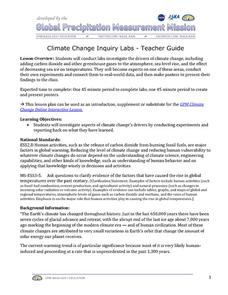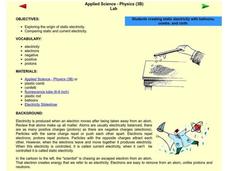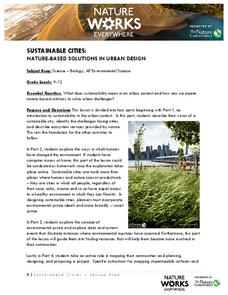CK-12 Foundation
Development of Hypotheses: Pressure versus Temperature
Is it me, or is it getting hot in here? Middle school science sleuths investigate the relationship between temperature and pressure, then use their observations to form a hypothesis. Questions embedded in the interactive help guide...
Curated OER
How to Use Classroom Animals to Spark Life Science Inquiry
Use low maintenance classroom pets to get your students engaged in life science inquiry investigations.
NASA
Climate Change Inquiry Lab
With global temperatures on the rise faster than ever recorded, the effects of a heating planet could be devastating. Allow learners to discover just what the world is in store for if the warming continues through a series of videos, a...
Curated OER
Sun and Shadows
Why do shadows look different in the summer than in the winter? What causes day and night? How can a sundial be used to tell time? Answer these questions and more through two engaging lessons about light and shadows. Fourth and fifth...
NOAA
Waves
Is it possible to outrun a tsunami? After watching a presentation that explains how waves and tsunamis occur, class members investigate the speed of tsunamis triggered by an earthquake.
It's About Time
How Electrons Determine Chemical Behaviors
Lead the class on an investigation as they play detective and locate patterns in the electron arrangement of atoms. During the seventh lesson, they assign valence numbers to elements, organize the periodic table in the correct sequence,...
Space Awareness
Fizzy Balloons - C02 in School
Carbon dioxide is a very important gas; it is present in the air, used in cooking, and supports plant and animal life. Scholars investigate the properties of carbon dioxide with three different activities. They experience a color change,...
American Museum of Natural History
Trip Up Your Brain
Sometimes different parts of the brain disagree. See what this disagreement looks like using a remote learning resource to experience how brains often take shortcuts. Pupils complete the activity, observe their results, and then read...
National Wildlife Federation
Yesterday: Our Energy Needs Over Time
How has our relationship to energy changed over time? An engaging exploration challenges learners to create a timeline showing human energy needs and uses over time. Scholars review what timelines are, choose a 50-year period in history...
Science Matters
Plot Study
Small groups investigate plots of land to discover how abiotic and biotic factors interact. After recording their findings, scholars share observations with peers and self-reflect on the learning process.
Exploratorium
Thread the Needle
If you are setting up a rotation lab where learners are investigating vision at different stations, this activity can be used to explore depth perception. Setting up a giant needle eye, students attempt to pass a pencil through it with...
Institute of Electrical and Electronics Engineers
Engineered Music
Sound engineers investigate the structural design of a musical instrument, the recorder. They work in collaborative groups to choose an instrument to build out of everyday craft materials. It must be able to repeat a three-note sequence...
Kenan Fellows
Unit 2: DNA Analysis
Ever wonder how they solve those mysterious murders in TV crime dramas? The second of four units in a Biotechnology series introduces scholars to the many methods of DNA analysis. Pupils create and run their own gel electrophoresis...
Curated OER
Terrestrial Ecosystem Response to Climate Change
An extensive investigation of the Earth's climate changes awaits your environmental science classes. This top-notch presentation begins by looking at the history of Earth's climate and then predicts the impact on each major terrestrial...
Curated OER
Physical Science: Gravity
Learners investigate the properties of force and gravity and their effects on everyday life. In groups, they test various balls by bouncing them on different surfaces and observe the properties. In another activity, they test marbles and...
Curated OER
Applied Science - Physics Lab
Students explore electricity. In this Physics lesson, students investigate the origin of static electricity. Students compare static electricity to current electricity.
Nature Works Everywhere
Sustainable Cities
Investigate aspects of sustainable cities and relate them to where you live! A detailed instructional activity first investigates the definition of sustainability. Learners then explore human impact on the environment and social justice....
Howard Hughes Medical Institute
Icefish Adaptations
What adaptations exist in order for icefish to survive the subfreezing temperatures of the Antarctic Ocean? Middle and high schoolers can find out through watching a related 13-minute video and performing a simple investigation to...
K20 LEARN
More than Skin Deep
From crime to paternity, DNA fingerprinting has revolutionized how the world views inherited traits. Science sleuths investigate the facts about DNA profiling through a variety of activities. The Teacher's Guide includes printable...
NOAA
The Climate Team: Make a Solar Heat Engine
Learners investigate how solar energy is converted into heat in part two of the 10-part Discover Your Changing World series. They build and test homemade solar cookers to boil water and cook rice. Pupils consider the impact of heat...
Curated OER
Lesson 1: Fight the Flu: Seeing
The flu has been a deadly epidemic many times in the past. By examining technological innovations throughout history, then simulating the spread of disease from person to person through a classroom investigation, and finishing up with...
It's About Time
Who Eats Whom?
Packed with visual aids and multiple learning opportunities, an engaging exercise challenges individuals as they explore the role of producers, consumers, and decomposers. After discussing differences between food chains, food...
Concord Consortium
Dissolving
What happens to substances when they dissolve in water? Young scientists investigate the dissolving process with a colorful interactive. The resource illustrates changes in potential energy as solute particles interact with water...
Colorado State University
Can it Really Rain Fish and Frogs?
You've heard of it raining cats and dogs ... but what about fish and frogs? It turns out, one scenario is much more likely than the other! Intrepid weather investigators examine the curious behavior of waterspouts using a leaf blower,...
























